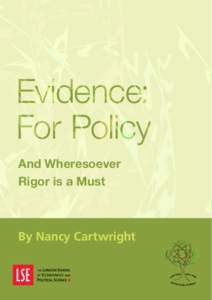Razor-sharp intellects immediately go for the essentials. They have no time for bullshit. And neither should we. In Evidence: For Policy Nancy Cartwright has assembled her papers on how better to use evidence from the sciences “to evaluate whether policies that have been tried have succeeded and to predict whether those we are thinking of trying will produce the outcomes we aim for.” Many of the collected papers center around what can and cannot be inferred from results in well-done randomised controlled trials (RCTs). A must-read for everyone with an interest in the methodology of science.
Topics:
Lars Pålsson Syll considers the following as important:
This could be interesting, too:
Robert Vienneau writes Austrian Capital Theory And Triple-Switching In The Corn-Tractor Model
Mike Norman writes The Accursed Tariffs — NeilW
Mike Norman writes IRS has agreed to share migrants’ tax information with ICE
Mike Norman writes Trump’s “Liberation Day”: Another PR Gag, or Global Reorientation Turning Point? — Simplicius
 Razor-sharp intellects immediately go for the essentials. They have no time for bullshit. And neither should we.
Razor-sharp intellects immediately go for the essentials. They have no time for bullshit. And neither should we.
In Evidence: For Policy Nancy Cartwright has assembled her papers on how better to use evidence from the sciences “to evaluate whether policies that have been tried have succeeded and to predict whether those we are thinking of trying will produce the outcomes we aim for.” Many of the collected papers center around what can and cannot be inferred from results in well-done randomised controlled trials (RCTs).
A must-read for everyone with an interest in the methodology of science.
